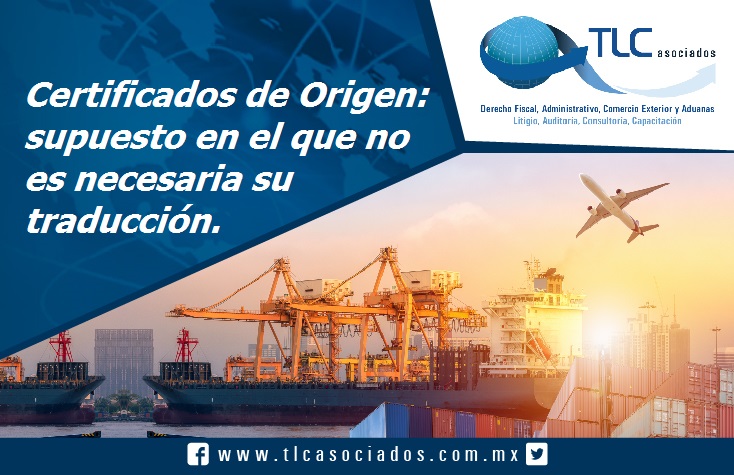
031 – Certificates of Origin: a scenario where the translation is not necessary
Ciudad de México, 02 de enero de 2017.
Sin otro asunto en particular quedamos a sus órdenes para cualquier duda o aclaración respecto de la presente información.
Atentamente
División de Consultoría en Comercio Internacional y Aduanas
TLC Asociados, S.C.
tlcnegocios@www.tlcasociados.com.mx
Prohibida la reproducción parcial o total. Todos los derechos reservados de TLC Asociados, S.C. El contenido del presente artículo no constituye una consulta particular y por lo tanto TLC Asociados, S.C., su equipo y su autor, no asumen responsabilidad alguna de la interpretación o aplicación que el lector o destinatario le pueda dar.
January 2nd, 2017 in Mexico City.
Recently the Federal Tribunal of Administrative Justice has published the Thesis number VIII-P-2aS-12, considering as precedents rulings emitted by the Second Section of the Superior Chamber, whose rubric is: “CERTIFICATES OF ORIGIN. CASE WHERE THE TRANSLATION IS NOT NECESSARY”, criterion that indicates that the article 17 of the Political Constitution of the Mexican United States protects the human right of prompt and expedited justice, which establishes the obligation to the bodies imparting justice to respect such prerogative to avoid an extension in the trials due to unnecessary procedural delays, and that under that premise if in the federal contentious administrative trial, the claimant, for the purpose of proving the origin of the imported goods, exhibits the certificate of origin in a foreign language and, this has not been objected by the authority in regards to its validity, authenticity, content, and scope, it is appropriate for the resolving body to grant evidential value to it, even when it has been submitted in those terms, fundamentally for two reasons, the first in the sense that such issue is not a matter of controversy in the trial and, the second to guarantee the right that the claimant has to obtain prompt and expedited justice.
This means, while it is true that the Chambers of the Federal Tribunal of Administrative Justice usually require the Spanish translation in the case of exhibiting as evidence documents in foreign language, we can observe that such criterion interprets that regarding the CERTIFICATE OF ORIGIN through which the implementation of a preferential tariff treatment on imports to national territory, and that is exhibited in a language different to Spanish, the appropriate will be to give total evidential value without being necessary to require its translation to Spanish since it was not objected by the authority (only in that case) in regards to its validity, authenticity, content, or scope, this is, it is not a matter of controversy in the trial, furthermore, a requirement in that sense would delay the trial and would violate the human right that the governed has to obtain prompt and expedited justice in accordance with the article 17 of the Political Constitution of the Mexican United States.
Without anything else at this moment, do not hesitate to contact us.
Sincerely,
Foreign Trade and Customs Consultancy Division of
TLC Asociados, S.C.
tlcnegocios@www.tlcasociados.com.mx
Partial or total reproduction is prohibited. All rights reserved to TLC Asociados, S.C. The content of this article is not a private consultation, therefore, TLC Asociados, S.C., and its team and author, are not responsible for any interpretation or use that the reader or recipient could give to it.
Search
Nuestros servicios
- División de Auditoria Preventiva y de Cumplimiento
- División de Certificaciones OEA-NEEC-CTPAT
- División de Certificación en Materia de IVA/IEPS y Recinto Fiscalizado Estratégico
- División de Blindaje Legal
- División de Consultoría
- División de Lobbying
- Gestoría de Permisos Especiales
- Arquitectura Aduanera
- Revista TLC
- Libros TLC
